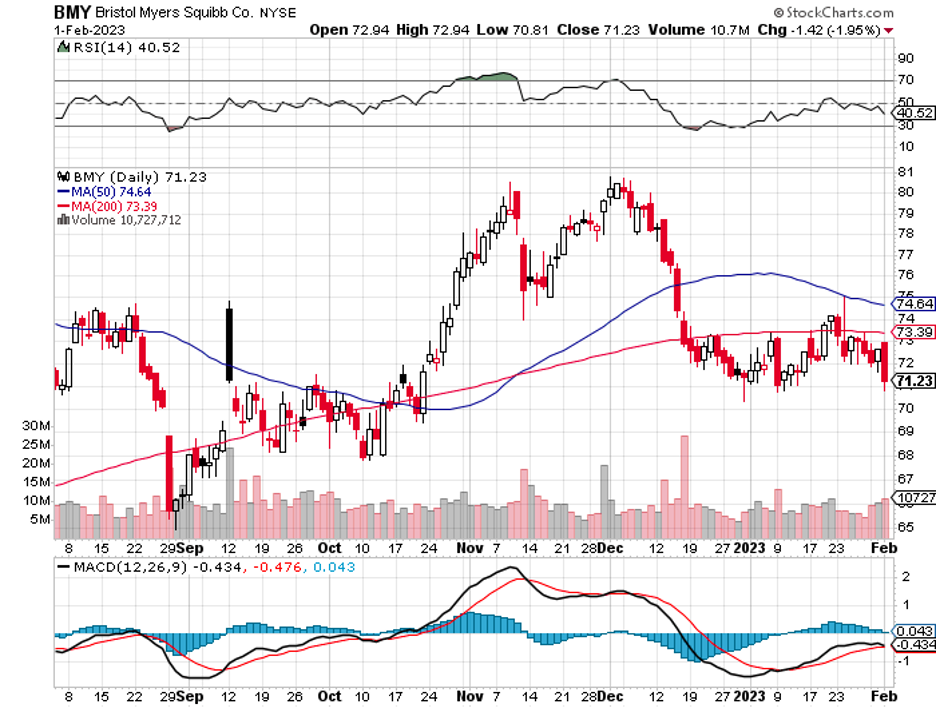A Strong Contender Against The Endless Volatility
Despite substantial advances, cancer remains the second-leading cause of death in the United States. In 2022 alone, it was estimated that over 1.9 million new instances of cancer would be diagnosed in the United States alone. More than 600,000 deaths from cancer are anticipated in 2023.
There’s also a massive financial expense that’s continuously growing. Last 2018, the country's top 15 kinds of cancer cost more than $156 billion. By 2030, the spending for cancer-related treatments is projected to soar to a whopping $246 billion.
However, every problem brings with it an opportunity. In the case of cancer treatments, there is a huge opportunity. While several small companies are working on cancer therapies, many investors feel uneasy with the high risk and volatility of these early-stage biotechnology stocks. This is where well-established players come in.
Among the biotechnology names associated with cancer, one of the standouts is Bristol Myers Squibb (BMY). The company currently markets five treatments, each generating sales of a minimum of $1 billion yearly.
BMY’s best-selling drug is blood cancer treatment Revlimid. Unfortunately, Revlimid sales are falling because of the emergence of generic competition.
Meanwhile, cancer immunotherapy Opdivo continues to be on track with its goal to surpass Revlimid in BMY’s lineup. By 2026, this product is projected to reach peak sales of $11.75 billion. This is roughly 50% more than its current sales record.
Aside from these blockbusters, BMY has several rising stars. One of them is Opdualag, an immunotherapy that’s a combination of Opdivo and a LAG-3 inhibitor called relatlimab. This new drug has the potential to hit peak sales of over $4 billion. The other blood cancer drugs, specifically Breyanzi and Abeam, also have the potential to reach blockbuster status in the following years.
BMY has placed itself in a prime position for success in early 2023 thanks to years of careful planning in anticipation of the patent expirations of its blockbusters.
With about $40 billion in operating cash flow, BMY has created the third most extensive Phase 2 trial base. These efforts ensure investors would be happy with short-term results as the company has released nine new treatments in the past three years. This trend is expected to continue until the end of the decade.
For the subsequent years, investors can expect more approvals, eventually becoming new revenue streams and cash flow generators. Looking at the candidates in its pipeline, BMY is estimated to generate $25 billion in additional revenues from these new treatments by 2030.
Then the candidates in earlier-stage trials would replace the newly approved treatments in the queue. This continuous cycle represents the power of a solid and robust pipeline.
Suppose you’re still uncertain about the dependability of BMY. In that case, it’s good to remember that even the Oracle of Omaha believes in this stock.
While healthcare names do not typically make up a considerable share of the portfolio of Berkshire, BMY has made the cut. Warren Buffett’s penchant for consistent and reliable stocks underscored BMY’s solid performance amid the pandemic.
Moreover, BMY raked in a lot of money, enjoying a free cash flow in the past 12 months that totaled more than $12.7 billion. This marks the company’s third consecutive year of delivering free cash flow of at least $10 billion.
Having substantial cash is a crucial, especially for a company that frequently gets involved in acquisitions. In 2022, BMY bought oncology firm Turning Point Therapeutics for $4.1 billion, which dwarfs in comparison to its $74 billion acquisition of Celgene in 2019.
In addition to all these, BMY pays a 3.1% dividend yield. For long-term shareholders, these factors make the stock an excellent investment.
Overall, BMY is a great addition to your healthcare portfolio. Apart from being a frontrunner in the highly lucrative cancer market, this stock has a proven track record that outshone the rest of its peers amid the volatility and uncertainties in the previous years.


